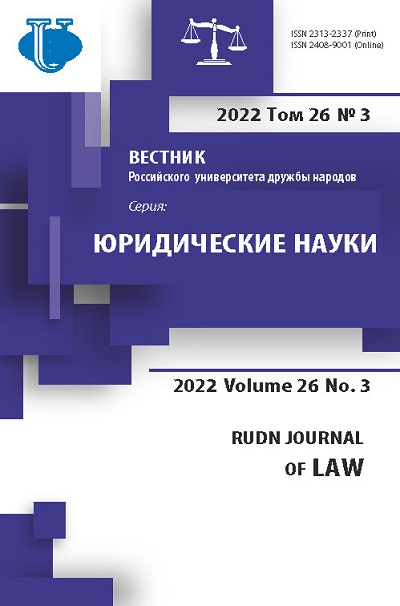Unprecedented law: protecting the Russian financial system against the impact of sanctions
- Authors: Tsepova E.A.1
-
Affiliations:
- Peoples’ Friendship University of Russia (RUDN University)
- Issue: Vol 26, No 3 (2022)
- Pages: 655-677
- Section: ADMINISTRATIVE AND FINANCIAL LAW
- URL: https://journals.rudn.ru/law/article/view/31835
- DOI: https://doi.org/10.22363/2313-2337-2022-26-3-655-677
- ID: 31835
Cite item
Full Text
Abstract
The subject of this article is the special economic measures adopted by the Russian Federation to counter the sanctions imposed by a number of states (the United States, the United Kingdom, some EU countries) at the beginning of 2022. The article reviews the concept of “economic sanctions” and its main goals. The author analyzes the experience of sanctions against such countries as Iran, North Korea, and Venezuela, including the reasons for imposing restrictions and their economic consequences. Particular attention is paid to the economic measures imposed against Russia and their unprecedented nature. Besides, the main response measures of the Russian Federation are studied. It was proved that despite the negative consequences, the sanctions did not collapse the Russian economy, as predicted by Western leaders. The author makes conclusion concerning effectiveness and timeliness of the taken protective measures. Moreover, it was found that the sanctions led to extremely negative consequences for the financial system of the countries that imposed restrictions contrary to the ideas related to economic efficiency. This indicates the extremely destructive nature of economic sanctions as an instrument of foreign policy and economic influence.
About the authors
Ekaterina A. Tsepova
Peoples’ Friendship University of Russia (RUDN University)
Author for correspondence.
Email: tsepova_ea@pfur.ru
ORCID iD: 0000-0001-8147-7633
Candidate of Legal Sciences, Senior Lecturer of the Department of Civil Law and Procedural Law and Private International Law, Law Institute
6 Miklukho-Maklaya str., Moscow, 117198, Russian FederationReferences
- Archick, K., Nelson, R.M., Rennack, D.E., & Welt, C. (2019) US Sanctions on Russia. Congressional Research Service R45415. Available at: https://www.everycrsreport.com/files/20200117_R45415_ccd0afb3308db7d592c51e5d7ba8b8cd0b5ce808.pdf [Accessed 6th May 2022].
- Bolton, I.K. (2019) Deterrence and the use of Sanctions. STO-MP-SAS-141. Available at: https://www.google.com/url?sa=t&rct=j&q=&esrc=s&source=web&cd=&cad=rja&uact=8&ved=2ahUKEwjHpd2g_9f3AhXFAxAIHT3ZAtIQFnoECA0QAQ&url=https%3A%2F%2Fwww.sto.nato.int%2Fpublications%2FSTO%2520Meeting%2520Proceedings%2FSTO-MP-SAS-141%2FMP-SAS-141-10.pdf&usg=AOvVaw0fiUbaqQwKH3cOEZjW-NeD [Accessed 7th May 2022].
- Bruchey, S. (1980) The impact of concern for the security of property rights on the legal system of the early American Republic. Wisconsin Law Review. 1135-1158.
- Bulychev, G.B. & Korgun, I.A. (2019) Sanctions and their implications for North Korea’s trade and economy. Problemy Dalnego Vostoka. 5(2), 64-75. https://doi.org/10.31857/S013128120007505-6 (in Russian).
- Cleveland, S.H. (2001) Norm internalization and US economic sanctions. Yale J. int'l L. 26 (1), 1-102.
- Dudin, M.N., Frolova, E.E., Kovalev, S.I., Ermakova, E.P., & Kirsanov, A.N. (2017). Migration processes in the context of political collisions: factors and social and economic consequences. Journal of Applied Economic Sciences. Vol. XII, Spring. 1 (47), 85-94.
- Epstein, G. (2012) Capital outflow regulation: Economic management, development and transformation. In: Gallagher, K.P., Griffith-Jones S. & Ocampo A.J. (eds.). Regulating Global Capital Flows for Long-Run Development. Boston, Boston University, Pardee Center for the Study of the Longer-Range Future. pp. 47-58.
- Frolova, E.E., & Ermakova, E.P. (2022) Legal regulation of digital financing in Russia and foreign countries. The Transformation of Social Relationships in Industry 4.0: Economic Security and Legal Prevention, 309.
- Frolova, E.E. & Tsepova, E.А. (2021) Prospects for reforming approaches to the legal status of a Russian resident individual. State and Law. 6, 158-172. https://doi.org/10.31857/S102694520015038-2 (in Russian).
- Komshukova, O.V. (2016) Sanctions against Iran: goals and consequences. Economic and social problems of Russia. (2), 24-41. (in Russian).
- Lin, Tom C.W. (2016) Financial weapons of war. Minnesota Law Review. 100, 1377. Available at SSRN: https://ssrn.com/abstract=2765010. [Accessed 7th May 2022].
- Mamedova, N.M. (2011) Sanctions regime for Iran and its impact on the situation in the country. World and National Economy. 2(17). Available at: https://mirec.mgimo.ru/2011/2011-02/rezhim-sankcij-v-otnoshenii-irana-i-ego-vliyanie-na-situaciyu-v-strane [Accessed 7th May 2022]. (in Russian).
- Petrova, E.A. (2019) Right to property protection under the US constitution: foreign practice. Zakony Rossii: opyt, analiz, praktika. (9), 58-62. (in Russian).
- Rendon, M. & Price, M. (2019) Are sanctions working in Venezuela? Center for Strategic & International Studies. Available at: http://csis-website-prod.s3.amazonaws.com/s3fs-public/publication/190903_RendonPrice_VenezuelaSanctions_layout_v2.pdf [Accessed 8th May 2022].
- Sorokin, D.A. (2018) Sanctions of democratic countries: effectiveness of influence on authoritarian countries. Business. Society. Power. 4(30), 95-113. (in Russian).
- Toloraya, G.D., Korgun, I.A. & Gorbacheva, V.O. (2020) Sanctions against the DPRK: an analysis of the consequences and lessons. Scientific report., Moscow, Institute of Economics RAS Publ. (in Russian).
- Tyagay, E.D. (2017) The Peculiarities of Protection and Measures of Legal Liability for Violations of the Rights of Real Estate Owners in the United States. Lex Russica. 5, 205-218. https://doi.org/10.17803/1729-5920.2017.126.5.205-216 (in Russian).
- Ushkov, I.V. (2016) The political implimintations of the agreement on Iran’s nuclear program. Observer. 1 (312), 61-71. (in Russian).
- Zakharova, L.V. (2019) The influence of UN security council sanctions on the North Korean. Economy. International Organisations Research Journal. 14 (2), 192-211. https://doi.org/10.17323/1996-7845-2019-02-09 (in Russian and English).
Supplementary files















